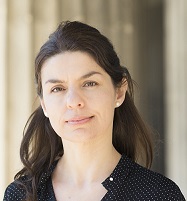
Sihem Amer-Yahia
Lab of Informatics of Grenoble, France
Sihem Amer-Yahia is a Silver Medal CNRS Research Director and Deputy Director of the Lab of Informatics of Grenoble. She works on exploratory data analysis and fairness in job marketplaces. Before joining CNRS, she was Principal Scientist at QCRI, Senior Scientist at Yahoo! Research and Member of Technical Staff at at&t Labs. Sihem currently leads the Diversity&Inclusion initiative for the data management community. She is Sihem is PC chair of SIGMOD 2023 and starting 2022 she will be vice-president of the VLDB Endowment.

Ricardo Baeza-Yates
Institute for Experiential AI of Northeastern University, USA
Ricardo Baeza-Yates is Director of Research at the Institute for Experiential AI of Northeastern University. He is also a part-time Professor at Universitat Pompeu Fabra in Barcelona and Universidad de Chile in Santiago. Before he was the CTO of NTENT, a semantic search technology company based in California and prior to these roles, he was VP of Research at Yahoo Labs, based in Barcelona, Spain, and later in Sunnyvale, California, from 2006 to 2016. He is co-author of the best-seller Modern Information Retrieval textbook published by Addison-Wesley in 1999 and 2011 (2nd ed), that won the ASIST 2012 Book of the Year award. From 2002 to 2004 he was elected to the Board of Governors of the IEEE Computer Society and between 2012 and 2016 was elected to the ACM Council. Since 2010 is a founding member of the Chilean Academy of Engineering. In 2009 he was named ACM Fellow and in 2011 IEEE Fellow, among other awards and distinctions. He obtained a Ph.D. in CS from the University of Waterloo, Canada, in 1989, and his areas of expertise are web search and data mining, information retrieval, bias and ethics on AI, data science and algorithms in general.
Regarding the topic of the seminar, he is actively involved as expert in many initiatives, committees or advisory boards related to Responsible AI all around the world: Global AI Ethics Consortium, Global Partnership on AI, IADB’s fAIr LAC Initiative (Latin America and the Caribbean), Council of AI (Spain) and ACM’s Technology Policy Subcommittee on AI and Algorithms (USA). He is also a co-founder of OptIA in Chile, a NGO devoted to algorithmic transparency and inclusion, and member of the editorial committee of the new AI and Ethics journal where he co-authored an article highlighting the importance of research freedom on ethical AI. https://link.springer.com/article/10.1007/s43681-021-00052-5

Toon Calders
University of Antwerp, Belgium
Toon Calders is a professor in the computer science department of the University of Antwerp in Belgium. He is an active researcher in the area of data mining and machine learning. He is editor of the data mining journal, and has been program chair of a number of data mining and machine learning conferences, including ECML/PKDD 2014 and Discovery Science 2016. Toon Calders was one of the first researchers to study how to measure and avoid algorithmic bias in machine learning and is one of the editors of the book “Discrimination and Privacy in the Information Society – Data Mining and Profiling in Large Databases”, published by Springer in 2013. He is currently leading a group of 6 researchers studying theoretical aspects of fairness in machine learning, as well as looking into practical use cases in collaboration with Flemish tax authorities, public welfare organizations, and an insurance company.

Carlos Castillo
Universitat Pompeu Fabra in Barcelona, Spain
Carlos Castillo is an ICREA Research Professor at Universitat Pompeu Fabra in Barcelona, where he leads the Web Science and Social Computing research group. He is a web miner with a background in information retrieval and has been influential in the areas of crisis informatics, web content quality and credibility, and adversarial web search. He is a prolific, highly cited researcher who has co-authored over 90 publications in top-tier international conferences and journals, receiving two test-of-time awards, four best paper awards, and two best student paper awards. His works include a book on Big Crisis Data, as well as monographs on Information and Influence Propagation, and Adversarial Web Search.

Georgia Koutrika
Athena Research Center, Greece
Dr. Georgia Koutrika is Research Director at Athena Research Center in Greece. She has more than 15 years of experience in multiple roles at HP Labs, IBM Almaden, and Stanford. Her work focuses on natural language data interfaces, data exploration, recommendations, and data analytics, and has been incorporated in commercial products, described in 14 granted patents and 26 patent applications in the US and worldwide, and published in more than 100 papers in top-tier conferences and journals.
Georgia is an ACM Senior Member, IEEE Senior Member, and ACM Distinguished Speaker. She is currently co-EiC for VLDB Journal, PC co-chair for VLDB 2023, co-EiC of Proceedings of the VLDB (PVLDB). In the past, she has served or serves as associate editor for TKDE, SIGMOD and VLDB, ICDE2021 sponsorship chair, and general chair for ACM SIGMOD 2016.

Sophia Kypraiou
Women at the Table Lausanne, France
Sofia Kypraiou is a data scientist and the Programme Associate and developer of the an initiative of the Swiss NGO Women at the Table, developed in collaboration with EPFL (École polytechnique fédérale de Lausanne) and the Office of the High Commissioner for Human Rights (OHCHR) in Geneva.
She recently completed her Master’s degree in Data Science at EPFL, having done her thesis on this very topic. Her research interests focus on fairness, human rights and their applications.
She holds an undergraduate degree from the Department of Informatics and Telecommunications of the National and Kapodistrian University of Athens.

Jahna Otterbacher
Open University of Cyprus
Jahna Otterbacher received her doctorate from the University of Michigan (Ann Arbor, USA), School of Information. She is currently Associate Professor at the Open University of Cyprus (OUC), and Vice Dean of the School of Pure and Applied Sciences. Jahna coordinates the Cyprus Center for Algorithmic Transparency (CyCAT) at the OUC, funded by the H2020 Widespread Twinning program. In addition to her post at the OUC, Jahna holds a concurrent appointment as team leader of the Transparency in Algorithms Group at CYENS, a new center of excellence and innovation in Nicosia, Cyprus, in collaboration with two international Advanced Partners, UCL and MPI.

Evi Pitoura
University of Ioannina, Greece
Evi Pitoura is a Professor at the University of Ioannina, Greece where she also leads the Distributed Management of Data Laboratory. She received a BSc degree from the University of Patras, Greece, and an MS and PhD degree from Purdue University, USA. Her research interests are in the area of data management systems with a recent emphasis on social networks, temporal graphs and responsible data management. Her publications include more than 150 articles in international journals (including TODS, TKDE, TPDS, PVLDB) and conferences (including SIGMOD, ICDE, EDBT, CIKM, WWW) and a highly-cited book on mobile computing. Her research has been funded by the EC and national sources. She has served or serves on the editorial board of ACM TODS, VLDBJ, TKDE, DAPD and as a group leader, senior PC member, or co-chair of many international conferences (including PC chair of EDBT 2016 and co-chair of ICDE 2012). She is the recipient of three best paper awards (ICDE 1999, DBSocial 2013, PVLDB 2013), a Marie Currie Fellowship (2009) and two Recognition of Service Awards from ACM.

Kostas Stefanidis
Tampere University, Finland
Kostas Stefanidis is an Associate Professor at the Faculty of Information Technology and Communication Sciences (ITC) of the Tampere University in Finland, where he also leads the Group on Recommender Systems. Kostas has more that 10 years of experience in different roles at ICS-FORTH in Greece, NTNU in Norway and CUHK in Hong Kong. He got his PhD in personalized data management from the Univ. of Ioannina in Greece. His research interests are in the broader area of big data. His work focuses on personalization and recommender systems, entity resolution, data exploration and data analytics, with a special focus recently on socio-technical aspects in data management like fairness and transparency, and published in more than 100 papers in top-tier conferences and journals. He has been involved in several international and national research projects and he is also actively serving the scientific community. Currently, he is the General co-Chair of the SWH Workshop, co-located with ISWC, the Program co-Chair of the DOLAP Workshop, co-located with EDBT, and the Proceedings Chair of VLDB 2023.

Julia Stoyanovich
New York University, USA
Julia Stoyanovich is an Institute Associate Professor of Computer Science & Engineering at the Tandon School of Engineering, Associate Professor of Data Science at the Center for Data Science, and Director of the Center for Responsible AI at New York University (NYU). Her research focuses on responsible data management and analysis: on operationalizing fairness, diversity, transparency, and data protection in all stages of the data science lifecycle. Julia developed and has been teaching courses on Responsible Data Science at NYU, and is a co-creator of an award-winning comic book series on this topic. In addition to data ethics, Julia works on the management and analysis of preference and voting data, and on querying large evolving graphs. She holds M.S. and Ph.D. degrees in Computer Science from Columbia University, and a B.S. in Computer Science and in Mathematics & Statistics from the University of Massachusetts at Amherst. She is a recipient of an NSF CAREER award and a Senior Member of the ACM.
Panel Members

Anthi Koskina
Professor of Law, Collège Idef-PARIS XIII, Athens, Greece (2015); Research Fellow, Athens Public International Law Center (AthensPIL), National and Kapodistrian University of Athens, Greece (2015).
She obtained her PhD Cum Laudae on “The right to conduct scientific research”, from the National and Kapodistrian University of Athens, Greece (2011), published as a monograph in 2013 (Nomiki Bibliothiki Eds.). She is the recipient of a prestigious fellowship for young researchers, co-funded by the Greek Ministry of Economy and the EU (NSRF 2014-2020), to conduct research on “Artificial Intelligence and Space Law” (2019). She was elected to the International Visiting Professor Program 2020, under the fellowship of the University of Science and Technology of China Fellowship Initiative (Hefei, China). She is collaborating with the National Observatory of Athens, Greece, on Space Law matters (2020). She is a member of the Hellenic Society of International Law and International Relations (HESILIR), the European Society of International Law (ESIL), the European Center for Space Law (ESA – ECSL) and a Lawyer at the Athens Bar (2002). She has published many articles on Science, Technology and law; Artificial Intelligence Law; Space Law and Environmental Law in national and international journals and participated in several national and international conferences on these topics.

Katharina Kinder-Kurlanda
University of Klagenfurt, Austria
Katharina Kinder-Kurlanda is Professor of Digital Culture and Director of the Digital Age Research Center (D!ARC) at Klagenfurt University. She studied cultural anthropology, computer science and history in Tübingen and Frankfurt in Germany and received her PhD from Lancaster University in the UK in 2009. Before coming to Klagenfurt, she was a team leader at the GESIS – Leibniz Institute for the Social Sciences. She works between disciplines, with the aim of building bridges, especially between the social sciences and computer science. Her research interests are new epistemologies for Big Data, algorithms in everyday life and work, data practices, data ethics and social casual games.

Eirini Ntoutsi
Freie Universität, Berlin, Germany
Eirini Ntoutsi is currently an associate professor at the Faculty of Electrical Engineering and Computer Scienceat the Leibniz University Hannover and member of the L3S Research Center. Her research lies in the fields of Artificial Intelligence and Machine Learning and can be summarized as developing methods for i) learning over complex data and data streams, covering aspects such as adaptive learning, change detection and stability as well as ii) responsible Artificial Intelligence, covering aspects such as fairness-aware learning, data quality and proper evaluation of AI/ML methods.
Prior to joining LUH, she was a post-doctoral researcher at LMU, Munich in the group of H.-P. Kriegel, which she joined in 2010 with an Alexander von Humboldt Foundation fellowship. She obtained her PhD from the Uni. of Piraeus, Athens under the supervision of Y. Theodoridis. She holds a diploma and a M.Sc. in Computer Engineering & Informatics both from the Computer Engineering & Informatics Department (CEID), Uni. of Patras, Greece.
Her work has received several awards, including an Alexander von Humboldt fellowship for postdocts, a best-student paper award at ICBK 2018 and the 1st place in the 2006 innovation competition in Greece. Her research is supported by prestigues funding bodies, including the German Research Foundation (DFG), the Volkswagen Foundation and the EU.

Athena Vakali
Faculty Member, Informatics Deparment, Aristotle University of Thessaloniki, Greece
I’m privileged by a profession which constantly evolves and opens research and innovation horizons. Being a professor at a Greek University has given me valuable knowledge and skills. Working with a vibrant worldwide network of colleagues, researchers and entrepreneurs offers strong empowering and serendipitous experiences. My vision is to encourage and motivate our bright young researchers to progress and excel with open minds and high ethical standards for establishing social good and sustainable Data Science and ICT solutions.

John Zerilli
University of Oxford and University of Cambridge
John Zerilli is a philosopher with particular interests in cognitive science, artificial intelligence, and the law. He is currently a Leverhulme Fellow at the University of Oxford and an Associate Fellow at the Centre for the Future of Intelligence in the University of Cambridge. He has published numerous articles, canvassing law, political economy, philosophy, and cognitive science, and three books, of which the two most recent are The Adaptable Mind (Oxford University Press, 2020) and A Citizen’s Guide to Artificial Intelligence (MIT Press, 2021).